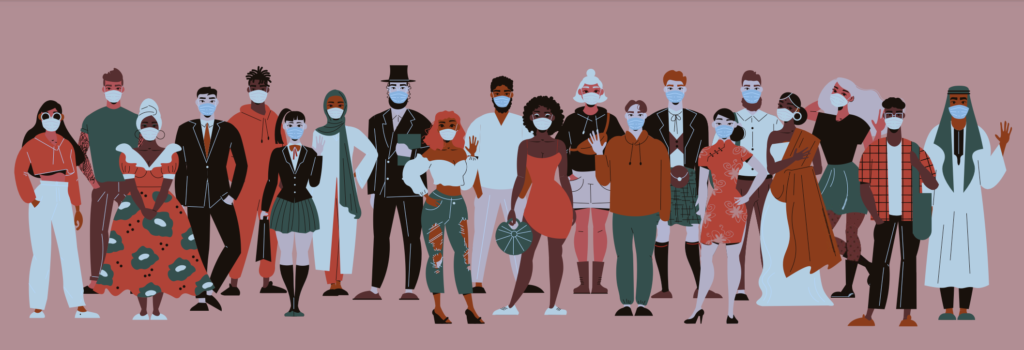
This article was originally published in the July/Aug 2021 issue of San Diego Lawyer Magazine.
By Gayani Weerasinghe
COVID-19 has served as an eye-opening experience on how interconnected our world is, how income disparities and institutional racism disproportionately impact the health outcomes in communities of color, and the ever-growing importance of educating the public on the science of vaccine development.
According to Centers for Disease Control and Prevention (CDC), in comparison to their white counterparts, Black and African American communities were 1.1 times more likely to develop COVID-19, 2.9 times more likely to be hospitalized, and 1.9 times more likely to die from the disease; Hispanic and Latino communities were twice as likely to develop COVID-19, 2.8 times more likely to be hospitalized, and 2.3 times more likely to die.1 Yet the vaccine hesitancy is dramatically higher in communities of color for a variety of reasons.2
For example, we have a history of situations where underrepresented populations were targeted for unethical medical research,3 such as the Tuskegee syphilis experiment, where government medical workers in rural, segregated Alabama withheld from unsuspecting Black men infected with syphilis the treatment option of giving penicillin so doctors could track the disease and dissect their bodies when they died.4 Yet, for us to overcome the COVID-19 spread, we need to vaccinate a critical mass of people; while this includes many complicated logistics, one of the challenges for the U.S. is establishing trust in the medicine with communities of color.
At the forefront of the COVID-19 vaccine development is the scientific lead, Dr. Kizzmekia S. Corbett, who has been commended as one of the leaders in developing the mRNA Moderna Vaccine.5 Dr. Corbett is an African American immunologist at the National Institutes of Health who is now playing a critical role in the fight to gain trust of vaccine-hesitant communities as she spends time doing outreach to reduce skepticism over the safety of the vaccines.6
“Most Americans have never seen a Black woman standing in front of a national audience saying she is leading a team in the development of a vaccine […] it makes a difference when you see someone looking like [her] involved in the development of this vaccine,” said Dr. Freeman A. Hrabowski, III, president of The University of Maryland, Baltimore County (UMBC), at a community forum, explaining the significance of seeing a Black scientist leading the charge for COVID-19 vaccinations.7
The lack of diversity in the STEM field8 represents a bigger problem if we cannot do better because, as Dr. Corbett put it, “It’s not about what you’re saying, it’s about how you relate to the people you are saying it to.”9 Advocating for diversity, equity, and inclusion at every level of our society, including places of innovation that are bringing forth valuable medicine, is critical to solving the existential crises we face as a society.
Gayani Weerasinghe (gayani@lawgrw.com) is an Intellectual Property & Business Law Attorney for the Law Offices of Gayani R. Weerasinghe, helping small businesses and entrepreneurs with their legal needs. She is also the host of the YouTube channel Inventive Mind.
FOOTNOTES
1. Hospitalization and Death by Race/Ethnicity, CDC (Updated May 2, 2021), https://www.cdc.gov/coronavirus/2019-ncov/covid- data/investigations-discovery/hospitalization-death-by-race- ethnicity.html.
2. Kimberly H. Nguyen, et al., “COVID-19 Vaccination Intent, Perceptions, and Reasons for Not Vaccinating Among Groups Prioritized for Early Vaccination — United States, September and December 2020,” 70 MMWR 6, 217-222, https://www.cdc. gov/mmwr/volumes/70/wr/pdfs/mm7006e3-H.pdf.
3. Darcell P. Scharff, et al., “More Than Tuskegee: Understanding Mistrust About Research Participation,” 21 J Health Care Poor Underserved 3, 879-897 (Aug. 2010), https://www.ncbi.nlm.nih. gov/pmc/articles/PMC4354806/.
4. The U.S. Public Health Service Syphilis Study at Tuskegee, CDC, https://www.cdc.gov/tuskegee/timeline.htm (last checked June 7, 2021); “Trump Officials Oppose Funding Museum for Victims of Tuskegee Syphilis Study,” The Guardian, June 24, 2017, https://www.theguardian.com/us-news/2017/jun/24/tuskegee- syphilis-study-victims-trump-opposes-memorial.
5. Miranda Bryant, “Fauci Praises African American Scientist
at ‘Forefront’ of Creating COVID Vaccine,” The Guardian, Dec. 14, 2020, https://www.theguardian.com/world/2020/dec/14/ kizzmekia-corbett-african-american-scientist-covid-vaccine.
6. Nidhi Subbaraman, “This COVID-Vaccine Designer Is Tackling Vaccine Hesitancy in Churches and on Twitter,” Nature, Feb. 11, 2021, https://www.nature.com/articles/d41586-021-00338-y.
7. Community Forum With Dr. Kizzmekia Corbett: Everything You Should Know About the COVID-19 Vaccines, Urban Health Institute Blog, Feb. 4, 2021, https://urbanhealth.jhu.edu/ blog/home/community-forum-with-dr-kizzmekia-corbett- everything-you-should-know-about-the-covid-19-vaccines.
8. Measuring Diversity in the Biotech Industry: Building
an Inclusive Workforce, Center for Talent Innovation in partnership with BIO, Jan. 2020, https://www.bio.org/here- your-copy-bios-first-annual-report-diversity-and-inclusion. (Looking at sampling of 98 respondent companies that are members of BIO found only 4% of total employees were Black, 5% were Hispanic/Latinx, 22% were Asian, 0% identified as Native American/Alaskan Native.)
9. Subbaraman, supra note 6